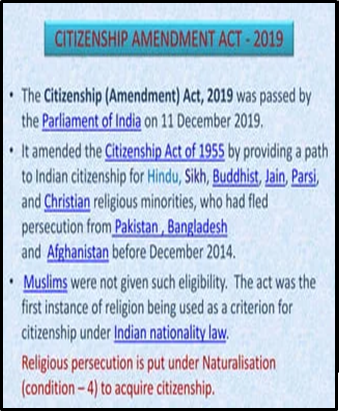UNION GOVERNMENT REVISES CAA DOCUMENT REQUIREMENTS
Why in the news?
The Union Home Ministry updated the CAA rules to broaden acceptable documents for proving foreign origin and added flexibility in certification, impacting citizenship applications for certain non-Muslim migrants.
source:slideshare
Union Government Amends CAA Guidelines:
Key Changes:
- Document Requirements: The Union Home Ministry has updated the Citizenship (Amendment) Act (CAA), 2019 rules, which previously required proof of foreign origin from government authorities in Afghanistan, Bangladesh, or Pakistan.
- Expanded Document List: The updated guidelines now include documents issued by Indian state or central government authorities or quasi-judicial bodies. An “etc.” clause allows for discretion in document evaluation by officials.
- Certification Flexibility: Local priests or reputed community institutions can now issue certificates verifying an applicant’s faith.
Citizenship Provision:
- Eligibility: The CAA facilitates citizenship for six non-Muslim communities from Afghanistan, Bangladesh, and Pakistan who entered India before December 31, 2014.
- Application Processing: Government officials from various departments have been instructed to understand the facilitative nature of the CAA when processing applications.
Impact and Context:
- Practical Application: Schedule 1A has not posed significant issues for Hindu migrants from Pakistan, as most have entered India with valid documentation like passports and visas.
- Legislative Background: In December 2019, the Citizenship Act, 1955 was amended to allow citizenship for undocumented migrants from six non-Muslim communities.
About Citizenship Amendment Act (CAA) 2019:
|





